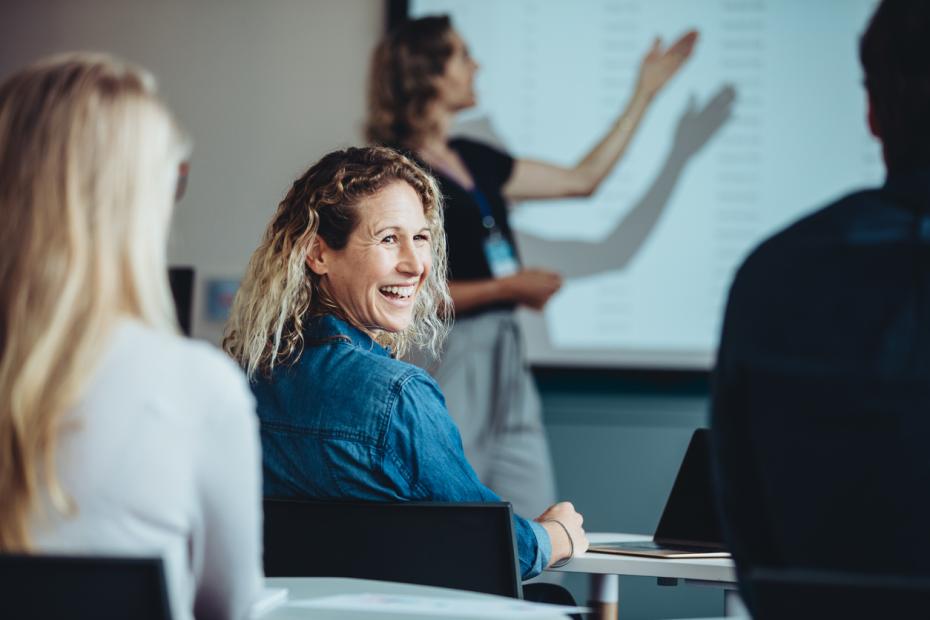
Peer review as a collegial approach to educator development
Expert support, structured reflection and near-peer dialogue can replace compliance and evaluation as a way to improve teaching practice. This flexible programme aims to turn conversation into action

University educators are facing mounting pressures – due to factors that range from the rise of AI to lingering post-pandemic fatigue. Faculty are expected to adapt to new teaching technologies, redesign curricula and meet institutional goals, all while managing increased workloads and shifting student expectations. As a result, educators have emphasised the need for career development approaches that are grounded in dialogue, reflection, collegiality and emotional trust, rather than judgement or review. They are looking for professional development that fosters resilience and meaningful engagement within the work community.
- Synchronous communication strategies for a successful learning design partnership
- Why is collegiality crucial and how can we foster it?
- Why we should be humans first and academics second
A collegial route to professional development is peer review, not as compliance but as an approach that blends expert support, structured reflection and peer dialogue. After a pilot in 2024, the Reflective Peer Teaching Development (RPTD) programme has been introduced at Deakin University.
From evaluation to conversation
Many peer review models in higher education focus either on evaluation and accountability or on professional learning, but rarely both – limiting their long-term effectiveness. Development-focused models such as collegial faculty development and collaborative peer-observation circles emphasise shared reflection but often lack expert input or formal recognition.
The RPTD programme addresses this gap by combining Lily Min Zeng’s developmental review continuum, David Gosling’s collaborative peer learning, Rachelle Esterhazy et al’s trust-based engagement, and Puspha Sinnayah et al’s cyclical peer observation. With added expert mentorship, guided self-evaluation and institutional alignment, the programme fosters a collegial and impactful teaching community.
How the reflective peer teaching development works
The programme runs over a 12-week semester, and guides educators through stages of peer collaboration, expert mentorship and self-directed growth. It’s flexible and tailored, rather than a one-size-fits-all approach. Its three streams are:
- Collaborative (near-peer support): Educators work in pairs, sharing observations and feedback in a low-stakes, collegial setting. Guided by reflection templates, these peer partnerships focus on practical teaching strategies and mutual learning.
- Developmental (expert support): This stream combines expert-led mentorship, participant-informed masterclasses, which cover topics such as assessment design, inclusion and digital engagement, and evidence-based resources aligned with institutional teaching and learning priorities.
- Self-evaluative (near-peer and expert support): After the collaborative and developmental phases, participants complete a guided self-evaluation. Using tailored templates and feedback from peers and experts, they reflect on what aspects of their practice may need improvement and how they plan to refine them in the future.
Across all three streams, participants focus on areas such as student engagement, feedback practices, teaching tools and accessibility.
Masterclasses that turn reflection into action
The programme’s masterclasses are not your typical sit-and-listen sessions. The two-hour workshops are shaped by what educators say they like to develop. Before the programme begins, participants complete a short needs analysis, which directly informs the content of the masterclasses.
Facilitated by experienced educators, the sessions are practical and hands on, and bridge the gap between reflection and action. The aim is to help educators think about their practice and actively evolve it.
Peer support and reflective templates that make conversations count
The programme offers a supportive take on peer observation. Instead of being observed by a manager or reviewed for performance, participants are paired with a peer – someone they trust – to exchange honest feedback in a safe, collegial space.
To guide these conversations, structured reflection templates detail thoughtful prompts, questions and icebreakers to help peers connect and get the dialogue flowing. These templates focus on key teaching themes like feedback, inclusion and student engagement – and every question is carefully aligned with the university’s teaching priorities and professional standards.
The result? The programme starts conversations that go beyond surface-level comments and into meaningful insights about what’s working, what could improve and how to make changes that matter. It’s about learning together, not alone.
Professional growth that aligns with the bigger picture
The programme connects personal development with the university’s bigger goals. It’s not just about improving an individual’s teaching skills – it’s about contributing to a wider culture of educational excellence.
The templates, peer discussions and even masterclass content are aligned with the university’s teaching frameworks and design principles. And this reminds educators that what they do in the classroom connects to something much larger.
A model worth sharing
As universities continue to navigate rapid change, we need professional development that’s scalable, meaningful and deeply human. The RPTD model prioritises conversation over compliance, reflection over reporting, and growth over grading. At its core, it creates space for educators to connect, support each other and build confidence in their teaching practice.
When trust, agency and collaboration are at the centre of academic development, educators feel empowered to keep learning, experimenting and evolving. Other universities might well consider adapting this model to support their own teaching communities.
Hasti Abbasi is a senior lecturer in learning futures at Deakin Learning Futures at Deakin University, Australia. Barbie Panther, director of Teaching Capability & Innovation at Deakin Learning Futures, contributed to this article.
If you would like advice and insight from academics and university staff delivered direct to your inbox each week, sign up for the Campus newsletter.
Additional Links
A scholarly paper introducing the model has been submitted to a leading journal, and another evaluating the programme’s impact will be submitted for publication later in 2025. This evaluation will draw on participant responses to explore how the initiative has influenced their teaching practice and supported their professional development.


